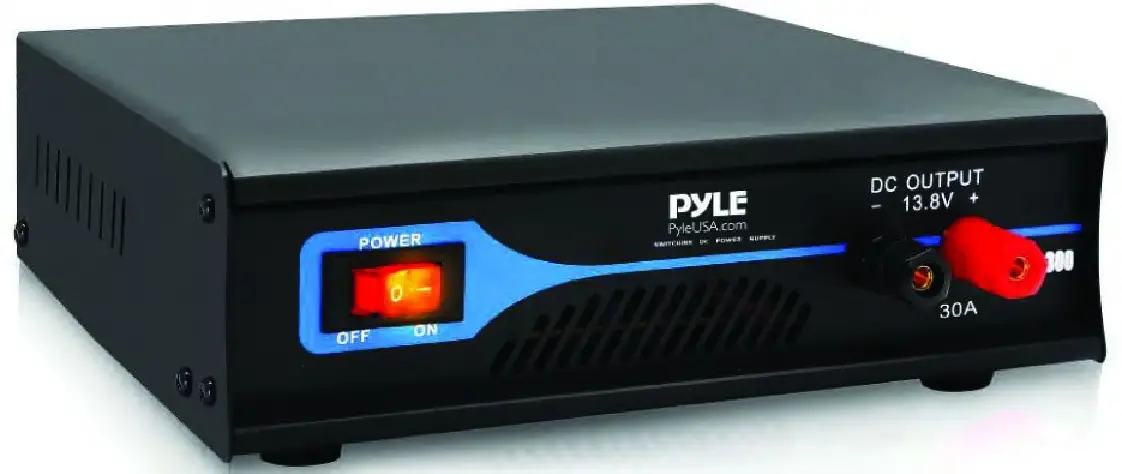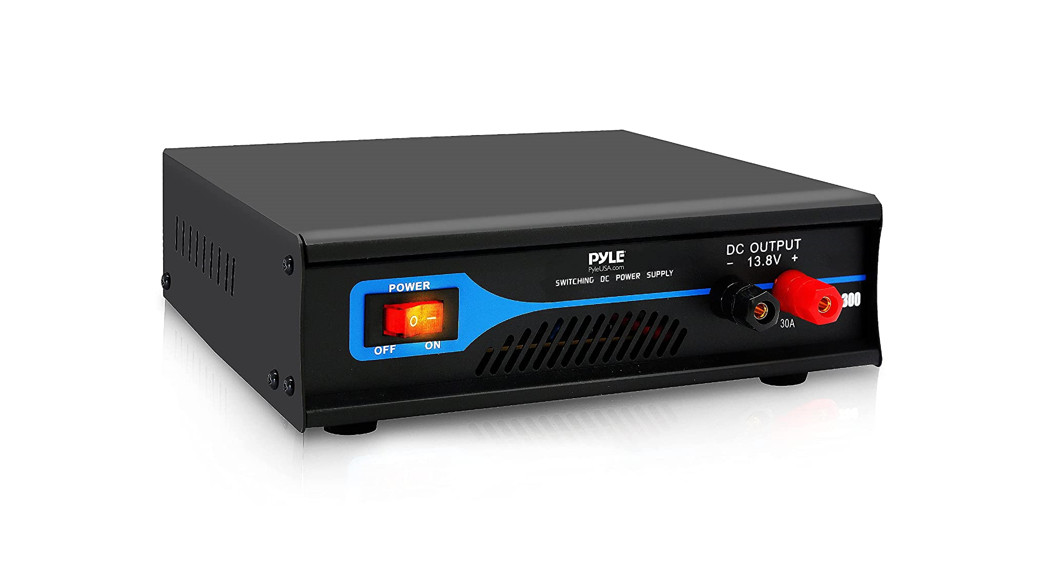PyleUSA.com
 PSV300Compact Bench Power SupplyAC-to-DC Power Converter (30 Amp)User Manual
PSV300Compact Bench Power SupplyAC-to-DC Power Converter (30 Amp)User Manual
Your PSV300 Heavy-Duty 30-Amp Switching DC Power Supply is designed to use AC power-to-power equipment that requires 12V DC automotive power. The power supply converts standard 120V AC household power to 13.8V DC power and can supply up to 30 amps of continuous power.
Note: Your vehicle’s electrical system provides 13.8 Volts when the engine is running.
If you’re an electronic hobbyist or technician, you will appreciate the many uses of the power supply at your workbench or in your house. For example, use your CB mobile transceiver as a bass station, check the operation of auto sound systems before you install them in your vehicle, or even power marine equipment such as pumps.
Your power supply’s features include
- Regulated Output Voltage-Makes it safe to use with mobile CBs, Ham radios, CD players, tape players, or anything you would power with a vehicle’s DC electrical system.
- Temperature cooling and fan Control have been provided to improve cooling at high loads.
- It will come on only when the power transformer temperature is above 50 ºC or 122°F due to higher loads. In case the fan fails or the airflow is blocked, a second temperature sensor mounted on the power transformer will activate over temperature shut down at 100 ºC or 212°F. The output voltage will be automatically resumed once the unit cools down.
- Electronic Overload Protection-automatically shuts off standard 120V AC input power to the power supply when its output is overloaded.
- Overheat Protection Circuit-automatically shuts off if it overheats.
- Combo Output Connectors act as both binding posts and banana plug terminals.
Not recommended for outdoor use.

IMPORTANT SAFETY INSTRUCTIONS
DANGER: TO REDUCE THE RISK OF FIRE OR ELECTRIC SHOCK, CAREFULLY FOLLOW THESE INSTRUCTIONS.
WARNING: This unit should not be directly connected to a battery for charging or for battery backup. Battery charging and battery back-up may be undertaken only when the battery is connected through suitable external isolating diodes and charge limiting resistors. The isolating diode will ensure that battery does not back power the power supply. When a battery is deeply discharged, it will initially draw a very large charging current and force the power supply into a current limit mode for prolonged periods. This is harmful to the power supply. The charge limiting resistor will limit the charging current to ensure the maximum charging current is well below the current limit value of the power supply.
This manual contains important safety and operating instructions for this power supply. Before you use the power supply, read all the instructions and cautionary markings in this manual, on the power supply, and on the product that you will connect to the power supply, to reduce the risk of injury:
- Do not use the power supply near water (for example, a bathtub, washbowl, kitchen sink, laundry tub, wet basement, or swimming pool).
- Do not place the power supply on an unstable cart, stand, or table. If the power supply fails, it could injure a person or cause serious damage to the power supply.
- Do not overload power outlets or extension cords. An overload can result in fire or electric shock.
- Do not use an extension cord unless absolutely necessary. Using an improper extension cord could result in a risk of fire and electric shock. If an extension cord must be used, make sure:a. The pins on the extension cord’s plug are of the same number, size, and shape as those of the plug on the charger.b. The extension cord is properly wired and in good electrical condition.c. The extension cord’s wire size is at least 18 AWG.
- Do not disassemble the charger; take it to a qualified service technician when service or repair is required. Improper reassembly may result in a risk of electric shock or fire.
- Do not use an attachment not recommended, this could result in a risk of fire, electric shock, or injury to persons.
- Never push any object into a slot in the power supply. It could touch dangerous voltage points or short-out parts resulting in a fire or electrical shock.
Caution: To reduce the risk of damage:
- Do not expose the power supply to rain or excessive moisture.
- Do not operate the power supply if it has been dropped or damaged in any way. Take it to a qualified service technician for repair.
- Slots and openings on the back and bottom of the power supply cabinet are for ventilation. To ensure the power supply’s reliable operation and to protect it from overheating, be sure these openings are not blocked or covered.
- The power supply should be operated only from a standard AC outlet that provides 120V AC/60 Hz, as indicated on the label. If you are not sure of the type of power supplied to your home, consult your local power company.
- For added safety, the power supply’s polarized plug fits only into a polarized outlet. If your AC outlet is not designed for the polarized plug, have an electrician install the correct outlet, or use an adapter to ground the power supply safely. Do not defeat the safety purpose of the plug.
- To protect the power supply during a lightning storm or when it is left unattended and unused for long periods of time, unplug it from the AC outlet. This will prevent damage to the power supply from lightning and power surges.
- Do not operate the power supply with a damaged cord or plug- replace them immediately. To reduce the risk of damage to the electric plug and cord:a. Make sure the cord is not located where it will be stepped on, tripped over, or otherwise subjected to damage or stress.b. Disconnect the power supply by pulling the cord’s plug rather than the cord.
- Unplug the power supply from the outlet before attempting any maintenance or cleaning. Do not use liquid or aerosol cleaners. Use a damp cloth for cleaning and then wipe it dry immediately.
- If your power supply does not operate normally, in particular, if any unusual sounds or smells coming from it, unplug it immediately and contact a qualified service technician for repair.
CONNECTIONS
Caution: Make all other connections before you connect the power supply standard AC power.
- Turn off the device requiring power.
- Set the power supply’s POWER switch to OFF.
- Turn the sleeves of the red and black binding output posts counterclockwise to expose the wire hole.
- Insert the device’s positive wire (usually red) into the red binding post’s wire hole, then tighten the binding post’s sleeve to secure the wire in place.
- Insert the device’s negative wire (usually black) into the black binding post’s wire hole, then tighten the binding post’s sleeve to secure the wire in place.
- If you are using the banana plugs connection, insert the plugs into the terminal’s jack.Warnings: To avoid damage to both the power supply and the device:• Follow the correct polarity when connecting the power supply and the device.• Do not let the ends of the positive and negative wires touch each other.Note: The binding posts’ wire holes can accommodate up to 16- gauge wire.
- Connect the power supply’s AC cord to a standard 120V AC outlet.
OPERATION
To use the power supply after you connect the device to it, set POWER to turn it ON with the red led light illuminated.
If the power supply’s POWER switch does not light, check all connections and confirm the wall AC outlet has power.
If the outlet has power, set POWER to OFF, reduce the load (by using a device that does not require more than 30 amps), then set POWER to ON. Your power supply’s overload protection circuit automatically shuts down the power supply when it is overloaded and resets by turning POWER to OFF.
Caution: Place your power supply in a well-ventilated open and cool area. Do not block the openings of the fan suction on the sides and the discharge openings on the bottoms.
Caution: To reduce the risk of energy hazard, be careful not to short the output terminal during operation. Remove the output connections after use.
Caution: Your power supply might cause TV or radio interference even when it is operating properly. To determine whether your power supply is causing the interference, turn off your power supply. If the interference goes away, your power supply is causing it.
Try to eliminate the interference by:
- moving your power supply away from the receiver.
- Connect your power supply to an outlet that is on a different electrical circuit from the receiver.
- contacting a qualified service technician for help.
Specifications are typical; individual units might vary. Specifications are subject to change and improvement without notice.
Features:
- Regulated Home Power Supply Design
- AC-to-DC Power Conversion
- Provides Constant Source of DC Voltage
- Simple Electronic Plug-in Operation
- Hassle-Free Screw Terminal Connectors
- Eliminates the Need for Battery or External Power Source
- Rugged & Durable Housing Construction
- Built-in Cooling Fan
- Power ON / OFF Switch
- Electronic Overload & Short Circuit Protection
- Used for Component & Device Equipment Testing, Operation & Performance
- Compact Hobby Power Supplies Safe for Tabletop Placement
What’s in the Box:
- 30 Amp Bench Power Supply
Technical Specs:
- Amperage: Up to 30-AMP (Constant)
- Connectors/Hardwire Terminals: Red Positive (+), Black Negative (-)
- Power Output: 13.8V DC
- Power Supply: 115/230V AC, Switchable
- Product Dimensions (L x W x H): 8.5” x 8.3” x 2.6” -inches
![]() WARNING This product can expose you to a chemical or group of chemicals, which may include “Nickel Carbonate” which is known in the state of California to cause cancer, birth defects, or other reproductive harm. For more info, go to https://www.p65warnings.ca.gov/.
WARNING This product can expose you to a chemical or group of chemicals, which may include “Nickel Carbonate” which is known in the state of California to cause cancer, birth defects, or other reproductive harm. For more info, go to https://www.p65warnings.ca.gov/.
PyleUSA.com VISIT US ONLINE:Have a question?Need service or repair?Want to leave a comment?PyIeUSA.com/ContactUs
VISIT US ONLINE:Have a question?Need service or repair?Want to leave a comment?PyIeUSA.com/ContactUs
Questions? Issues?We are here to help!Phone: (1) 718-535-1800Email: [email protected]
References
[xyz-ips snippet=”download-snippet”]

